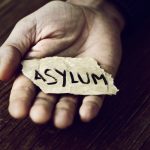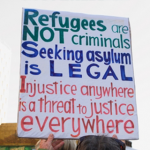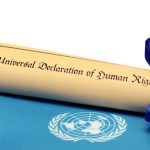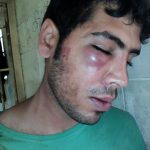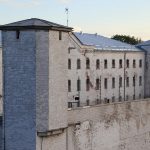In the Face of Manus, Australia’s UN Human Rights Seat Should Be Revoked
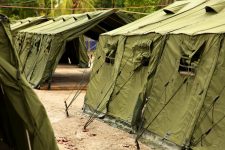
As you may have heard, the remaining 328 asylum seekers who were still at Manus Island detention centre were forcibly removed last Friday morning by Papua New Guinea police. Some reports have officers carrying metal rods to get them out, others say they used long sticks.
Reverend Tim Costello relayed that the men suffered lumps and bruises, but, as far as he was aware, there were no broken bones.
The PNG police spokesman chief superintendent Dominic Kakas told the ABC on Friday that the future of the men, who’ve been relocated to centres in Lorengau, is “up to the Australian government,” which sounds about right, as it sent them there in the first place.
Of course, there’s been dispute as to whether the construction of the transit centres have been fully completed. Government officials have said they have been for weeks. However, on Friday night, 57 men were forced to sleep on the floor of a classroom, as the centres aren’t completely ready.
These men have been kept in a prison in another country for over four years in order to teach the rest of the world that Australians don’t help desperate people.
The lucky country doesn’t need to.
Washed his hands
It’s now close to four weeks, since the Australian government sent home the detention centre staff, turned off the water, stopped the food supply, cut off the electricity and withdrew medication to 600 vulnerable people, who’d risked their lives across the seas to seek a better future.
Turnbull refused the offer New Zealand made to take in 150 of the men. He’s still banging on about resettling them in the United States. A deal that was strangely cut a year ago with the former Obama administration. Only 54 people have ever been relocated there.
Obviously, Australia doesn’t have enough money, or compassion, to settle a few hundred people that are already under its care, with nowhere to go.
Surely, it must be clear to minister Dutton by now, that if these people are willing to stay in such barbaric conditions, returning to their country of origin isn’t an option. But then again, that doesn’t seem bother him.
And now, Médecins Sans Frontières has come forth stating that it has been denied access to check on the health and well-being of these men, even though it was granted approval to do so mid-last week.
The humanitarian NGO isn’t quite clear why they’ve been blocked, but we can only hazard a guess.
The white sepulchral city
Australia likes to present itself in the international arena as a champion of human rights. Indeed, exactly two weeks prior to turning out the lights at Manus detention centre, the nation won a seat on the UN Human Rights Council: the leading body of its kind in the world.
The nation’s bid for the seat involved five pledges pertaining to how it “will seek to improve human rights – domestically and internationally.”
So, let’s take a look at one of those pledges: the freedom of expression.
The lesser of two evils
“Australia will advocate for the protection of journalists, human rights defenders and civil society.” However, the government didn’t speak out against the arrest of Iranian-Kurdish journalist and long-term Manus Island detainee Behrouz Boochani.
Boochani, who’s been reporting on the situation from the frontline, was arrested by PNG authorities last Thursday. He was singled out by officers that entered the detention centre and taken to gaol, where police told him that he was guilty, because he’s damaged their reputation.
In his account of the incident, Mr Boochani relates how the PNG police tied his hands together with rope, which caused him to remember how Australian guards had tied the hands of other refugees two years prior.
They tied them so tightly “that for one whole week blood had clotted around the rope marks leaving serious bruising,” Boochani recalled. “But I know the Manusians well. Even when their anger reaches its peak, they still cannot hide their kindness.”
“This time he tied me up in a way that was tight, but did not hurt me,” he continued. Boochani was released two hours later. A blink of an eye, compared to the time he’s spent in Australian detention.
The Pacific solution
In its bid for the UNHRC seat, Australia also pledged to “work with other states to support the implementation of their international human rights obligations.” And the nation pointed to the Indo-Pacific region as a specific focus.
Which is quite surprising, as a fortnight after gaining its seat, Australia blatantly ignored its obligations under the 1951 UN Refugee Convention that it became a party to on January 22 1954.
Article 33 of the convention, outlines the principle of non-refoulement: that a refugee cannot be sent to a place where they may be persecuted.
So, one might think that abandoning a group of 600 people in an area of a foreign country where violent incidents have repeatedly been reported could constitute that.
But, this country has a long history of this sort of behaviour. On March 20 2015, the Australian navy intercepted 46 Vietnamese asylum seekers at sea, and sent them back to the country they were fleeing from a month later.
While in July the year before, Australian authorities detained 157 Tamil asylum seekers from Sri Lanka and held them at sea for a month. It then took them to the mainland, before secretly flying them off to the detention centre on Nauru, where there’s been well-documented human rights abuses.
Redneck wonderland
But, while the humanitarian crisis unfolds on Manus Island, it must be remembered that the government responsible for it, is also responsible for the continuing humanitarian crisis within its own borders it so carefully protects.
Another of the five pillars of the bid for the UNHRC seat was to uphold the rights of Indigenous peoples. However, Aboriginal and Torres Strait Islander peoples have been suffering under the oppression of European rule for 229 years.
The overrepresentation of Indigenous peoples in prison, the deaths in custody, the continuing stolen generations under departments of community services, some of the highest suicide rates in the world, the Frontier Wars, the NT Intervention, the denial of sovereign rights… and the list goes on…
Australian authorities need to relax their tight fist, and open up their hand to a more humane way of being. No one wants to live under a growing police state, and walk down to Bondi Beach to see the waves roll in beyond the metres high razor wire.
So, let’s bring the Manus asylum seekers here…


